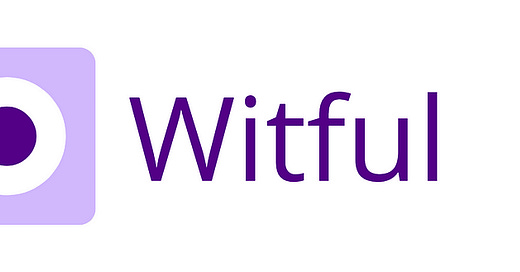Bootstrapping a Product
2020 was a strange and difficult year that I’m sure most are eager to forget. This is certainly true for us at Real Kinetic. However…
2020 was a strange and difficult year that I’m sure most are eager to forget. This is certainly true for us at Real Kinetic. However, there was some silver lining that made 2020 particularly interesting for us despite the year’s hardships. That’s because, pandemic notwithstanding, we managed to quietly launch a new product called Witful. Even though Real Kinetic is a consulting company, we’re all product people at heart. Indeed, a lot of what we talk about and the services we provide involve developing and shipping software products.
Our approach to developing a product is quite a bit different than the typical tech startup. For one, we are not VC-funded. We are fully bootstrapped using the revenues of our consulting business, and we’ve worked hard to develop a growing consulting practice while designing and developing a software product on the side. This has allowed us to fund development without the need for outside investment and without the usual race to the next round of funding that many startups tend to find themselves in — we already are profitable! We aren’t trying to rapidly grow headcount or growth hack our way to thousands of users. Instead, we are focused on steady, deliberate growth and building a small business that is both profitable and sustainable. One of our core values has always been maintaining a healthy work-life balance. We don’t want to be profitable if it means burning ourselves out. This continues to be the case with Witful.
This strategy has its trade-offs though. We are much more resource-constrained and have to be that much more calculated in our investments and decisions. We are just a team of five people, after all. While we may not be racing against the clock, we still have to be attentive of how we’re allocating our time and dollars. We also have to balance a completely separate line of business with our consulting. The upside, however — and something that makes our story a bit unique — is that we’re actually building a product for ourselves. Witful is something we use every day in our consulting work to make our lives easier. We think others can benefit from it too. Our goal is to make meetings suck less. We’re trying to better understand which audiences benefit the most from Witful. In an effort to expand our user base and improve the product, we’re offering Witful at no cost. Fill out our questionnaire and we’ll see if you might be a good fit.
As a result of our resource constraints, this strategy has also influenced our technology decisions for building Witful. We are not using containers, Kubernetes, or microservices. We’ve chosen technologies that minimize operations work and allow us to focus our time on developing features and functionality. The product is completely serverless on Google Cloud Platform with the bulk of it running on Firebase. This has allowed us to quickly build a single-page application that automatically syncs your data, even if you go offline. The frontend is mostly written in Elm, and the backend consists mostly of TypeScript.
Because we integrate with your Google calendar (Office 365 to come), we rely on Google login to provide a single sign-on experience without the need to store or manage user credentials. We use Google Cloud Functions for a number of backend components including calendar synchronization, Stripe integration, data backups, and our user invite system. For asynchronous processing, such as data migrations and calendar sync logic, we use Cloud Tasks in combination with Cloud Functions. This allows us to fan out work using queues and workers that are automatically managed and scaled. It also means Witful is quite resilient in the face of system failures or temporary outages. Lastly, we use BigQuery and Data Studio for analytics and dashboards that help us understand how our users use Witful. We use this information to inform our decisions around the product and guide our strategy.
Building a product of our own, especially one that we use ourselves on a daily basis, has been rewarding. It means we get to eat our own dogfood on multiple levels — both from the perspective of our consulting guidance around product development and cloud and from the perspective of being our own product customer. It’s also a lot of work as we continue to grow our consulting business.
We’re hopeful that 2021 will be a markedly different and better year than 2020 for everyone. For Real Kinetic, our goal is to double down on Witful, even if it means a strategy of slow-and-steady as we continue to bootstrap the product and iterate. Despite this, we remain committed to helping companies develop great products and engineering organizations themselves. Witful is just a manifestation of this that helps us be more effective, and we’re excited to share it with you.
Happy New Year!
Tyler





